- Home


- About
- Reports
- Academics
- PhD
- B.B.A.
- Students
- Faculty
- Research
- Library
- Alumni
- IQAC
- Extension
- Events
Counselling Cell
Expert Talk on “Happiness – The Science Behind it!”
On the 31st July, 2021 an online Expert Talk was conducted on the elusive topic “Happiness – The Science behind it!” from 4:00 p.m. – 5:00 p.m. The talk was delivered by Dr. Tina Roy, an alumna of PCER Chembur from the Batch of 2009-10.
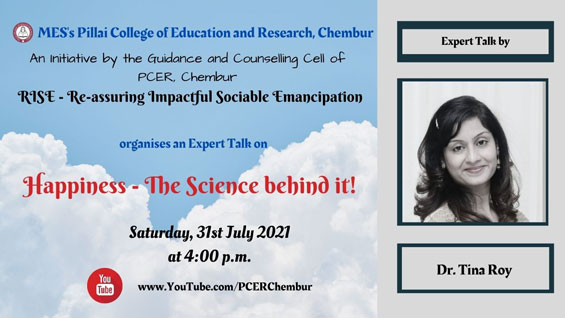
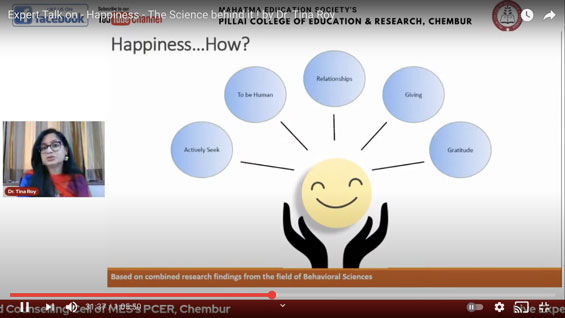
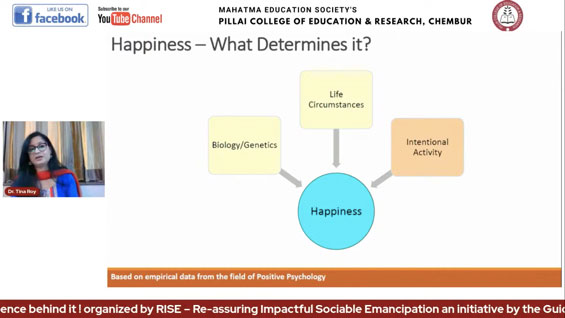
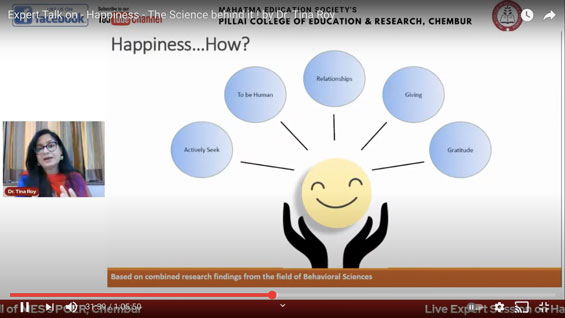
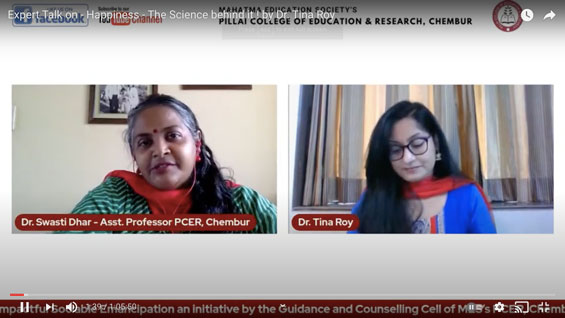
Developing happiness modules was a part of Dr. Tina’s doctoral thesis and she has conducted several workshops which help a person enhance their happiness. She spoke to the audience about what happiness is and how one can enhance their level of happiness.
According to her, there are five ways to enhance happiness. They are 1) Actively seeking happiness 2) Giving oneself the permission to be human 3) Nurturing Relationships 4) Giving to others and 5) Expressing gratitude.
Dr. Tina encapsulated the major research findings on happiness and also added her experience from conducting Happiness classes and encouraged all participants to try following these steps.
This activity was conducted under SDG # 3: Good Health and Well Being and can be viewed at https://www.youtube.com/watch?v=5JPprLubuV4&t=1901s
Session on “Menstrual Health & Hygiene”
On the 22nd July, 2021, the Guidance and Counselling Cell of PCER Chembur, under its initiative RISE (Re-assuring Impactful Sociable Emancipation) conducted an Expert Talk on the topic ‘Menstrual Health & Hygiene’.
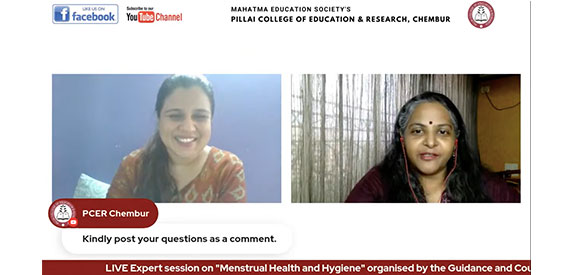
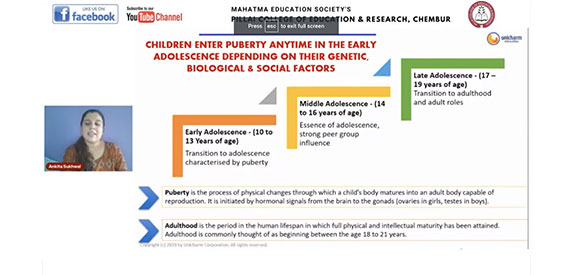
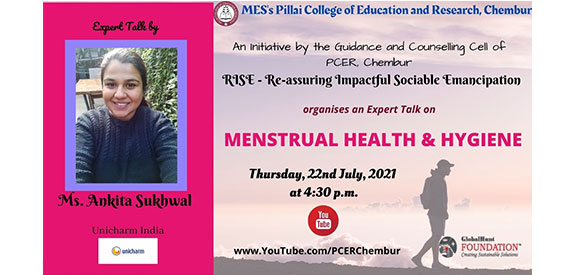
Ms. Ankita Sukhwal, a CSR Executive from Unicharm India conducted an hourlong online session from 4:30 p.m. to 5:30 p.m. on the topic which was broadcast live over PCER Chembur’s YouTube channel.
She emphasised the importance of menstrual cycle and how everyone should be open about this topic. As a background, she divided adolescence into 3 phases, early adolescence, middle adolescence and late adolescence. She then elaborated the role of hormones and the bodily changes which takes places in the human body during the entire lifetime right from pre-menopausal stage right up to menopause.
Ms. Sukhwal touched upon not only why menstruation takes place but also how to take care of oneself during this time of the month. She cautioned about how to track one’s period and explained the symptoms which requires one to go to a doctor.
At the end, she answered the queries put by the participants which were addressed to her via the live chat function.
This activity was conducted under SDG # 3: Good Health and Well Being and can be viewed at https://www.youtube.com/watch?v=D-5KCvegTKE&t=2290s
Session on “Mental Health” by Yvette Lee
On 11th March, 2020, Ms. Yvette Lee, a Counsellor at Mahatma Education Society took a Session on “Mental Health” with the students of F.Y. as well as the S.Y. She laid special emphasis on the use of Rational Emotive Behaviour Therapy (REBT) as proposed by Carl Rogers and gave examples of how the ABCDE Model can be applied to real life situations.
The ABCDE model speaks about focusing on identifying the activating event (A) which is triggered by a belief (B) resulting in a consequence (C). Generally, this consequence is harmful or unhealthy and the individual want to change the consequence (for the better). This leads to disputing the existing belief (D) and the launch of newer and better events (E).
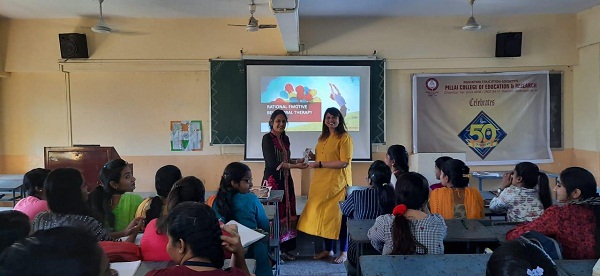
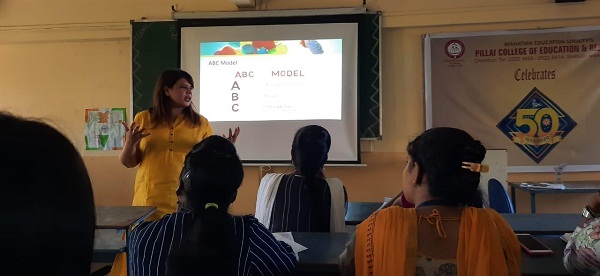
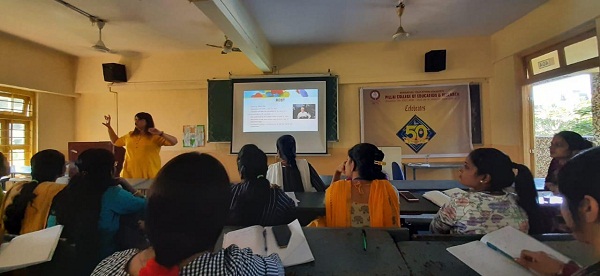
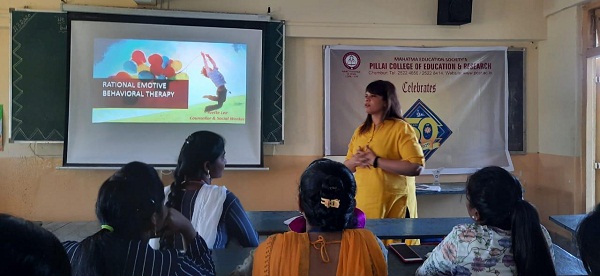
Session on “Effect of Corona Virus on Mental Health of B.Ed. Students”
Due to the outbreak of COVID-19, there is lot of anxiety and uncertainty among people. The students of our college are also facing the same. Dr. Sunita Jain conducted an online survey to find out the present mental health of the student teachers. The ones who are mentally strong, have good ideal self are able to complete their daily task diligently. But there were few students who were mentally stressed and were unable to cope up with the current scenario.
Based on the analysis of the data, zoom session was conducted on 3rd April, 2020 with the second year students and on 9th April, 2020 with the first year students. The session focused on the constructive strategies like self coping mechanisms, pursue your passions, do meditation, yoga, etc to cope up with the present lockdown. Moreover it gave lot of emphasis to value each one as precious and so is their mental health. At the end of the session, zoom session was open for the students to share their views and approaches at this difficult time.
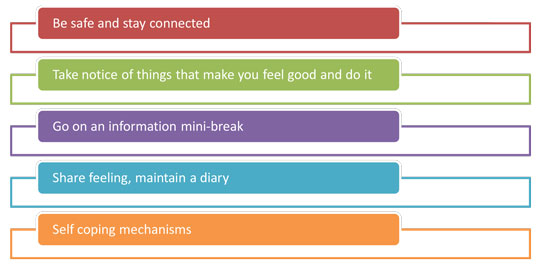
Counselling Cell 2018-19
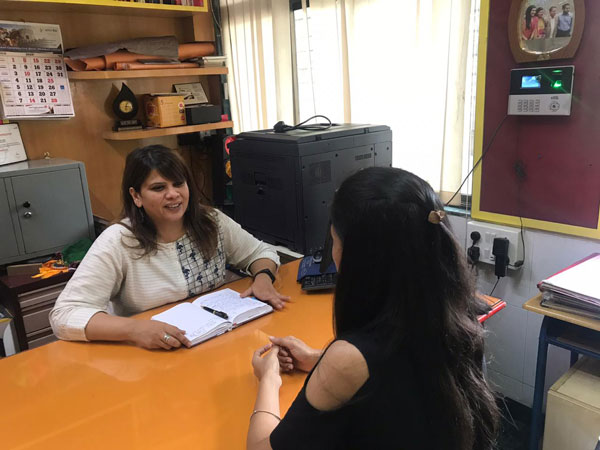
The Counselling Unit of the college for the academic year 2018-19 started functioning in the month of July, 2018. The counsellor met the students and told them of her availability on every Wednesday and Saturday. She also put up posters on notice boards.
During the year 5 students visited the Counselling Unit. All these students attended regular counselling sessions as per their needs. A total number of 17 individual counselling sessions were held in the academic year. The total number of 4 group sessions were held with the classes.
There were a range of issues and problems for which the students visited the counselling unit. These students were either referred by the teachers or came through self-referral. The teachers referred the students to the counsellor for issue related to stress related emotional as well as behavioural problems. The students visited the counsellor to discuss issues like- relationship problems, family issues, study related issues, anxiety and depression, low self-esteem and other personal problems.
Counselling Cell 2017-18

The Counselling Unit of the college for the academic year 2017-18 started functioning in the month of July, 2017. The counsellor met the students and told them of her availability on every Wednesday and Saturday. She also put up posters on notice boards.
During the year 8 students visited the Counselling Unit. All these students attended regular counselling sessions as per their needs. A total number of 22 individual counselling sessions were held in the academic year. The total number of 5 group sessions were held with the classes.
There were a range of issues and problems for which the students visited the counselling unit. These students were either referred by the teachers or came through self-referral. The students visited the counsellor to discuss issues like- stress related emotional as well as behavioural problems, relationship problems, family issues, study related issues, anxiety and depression and other personal problems.
